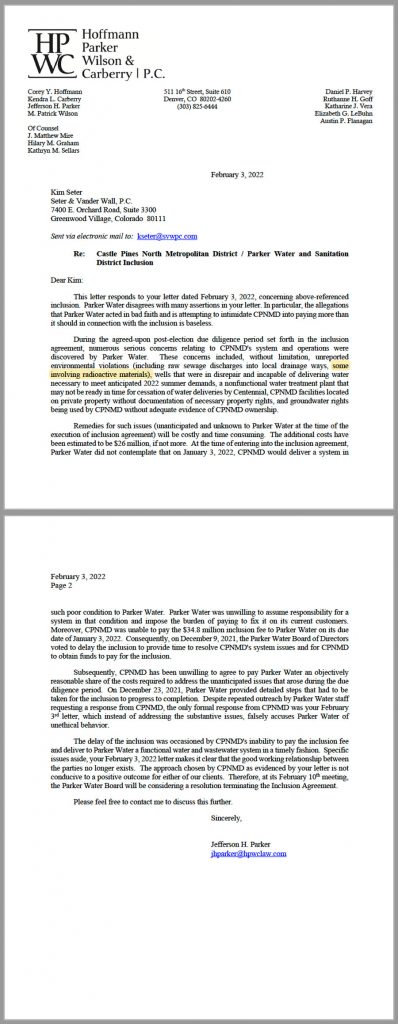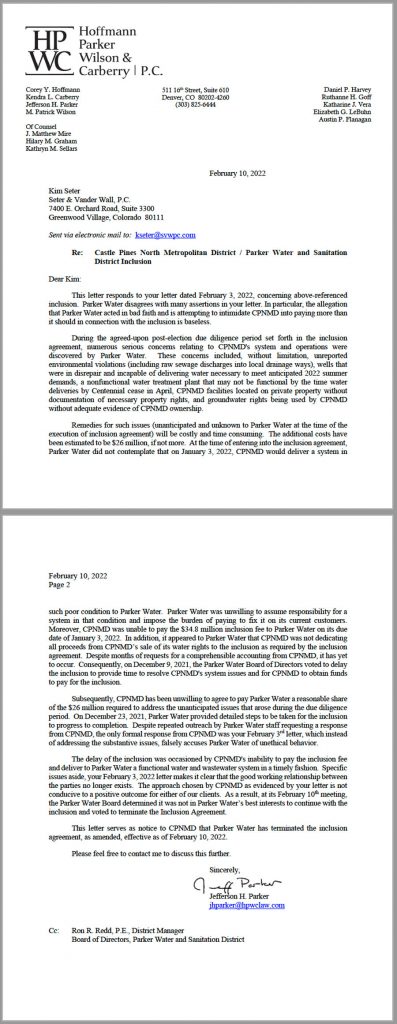Metro District inclusion failure clarification
By Terri Wiebold; graphics courtesy of PWSD and Colorado Open Records Act (CORA)
Draft letter to CPNMD

Letters in both draft and final form of PWSD’s termination of its inclusion agreement with CPNMD. They are evidence that no community members arbitrarily added inflammatory words after the fact as has been conjectured by CPNMD. Rather, PWSD removed potentially provocative language to avoid eroding confidence in CPNMD’s drinking water supply.
Final letter to CPNMD

Last month, The Connection reported on the failure of the voter-approved inclusion agreement between the Castle Pines North Metro District (CPNMD) and Parker Water & Sanitation District (PWSD).
Because of the “he said, she said” nature of the dispute between the two organizations, we chose to only include quotes from the letters written by attorneys from both organizations, so as not to indulge personal speculation or opinion in the article. A little good news aside, we reported on the facts.
On February 10, PWSD sent a letter to CPNMD stating “numerous serious concerns relating to CPNMD’s systems and operations” and giving notice of PWSD’s termination of the inclusion agreement. PWSD also shared the document with members of the community, mistakenly distributing its February 3 draft version instead of the final version, according to District Manager Ron Redd. The letter read (in part), “These concerns included, without limitation, unreported environmental violations (including raw sewage discharges into local drainage ways, including some involving radioactive materials), wells that were in disrepair and incapable of delivering water necessary to meet anticipated 2020 summer demands, a nonfunctional water treatment plant that may not be ready in time …”
Between the time of the letter The Castle Pines Connection (CPC) received and the final letter that PWSD sent to CPNMD, several minor changes were made, one of which removed the phrasing “including some involving radioactive materials.” CPC became aware of this after obtaining the requested Colorado Open Records Act (CORA) letter we received after the March issue had already gone to press.
This precise phrasing has been the topic of much discussion from CPNMD, including District Manager Jim Worley’s (in his words) “editorial” at the CPNMD Board meeting on March 21 where he said words had been added to the letter they received, and misinformation was being spread. Although there was no specific mention of The Connection article, accuracy is paramount to our organization, and in light of the changes to the final draft of the letter, we contacted PWSD to determine the circumstances surrounding the change.
In speaking with Redd, he clarified, “I did have the ‘involving radioactive materials’ removed from the draft letter because I was concerned the public might associate it with the drinking water and not the illegal discharge of the backwash by CPNMD. That CPNMD had illegally dumped water treatment backwash is a true statement (see Colorado Office of Emergency Preparedness & Response Department of Health and Environment case # 2021-0525), but it might unnecessarily erode public confidence in the drinking water supply, which is why I removed it.” He went on to explain that CPNMD filters out radionuclides from the drinking water, so the safety of the water was never in question, just the disposal of the waste following filtration.
In a press release PWSD sent CPC following the inclusion termination, Redd stated, “We still believe there is an opportunity for an inclusion with Castle Pines North Metropolitan District. Even if we’re not able to complete it at this time, we still believe that it could benefit both communities.” He continued, “These are complicated agreements, and sometimes it doesn’t happen the first time around. We remain open to revisiting this opportunity in the future.”